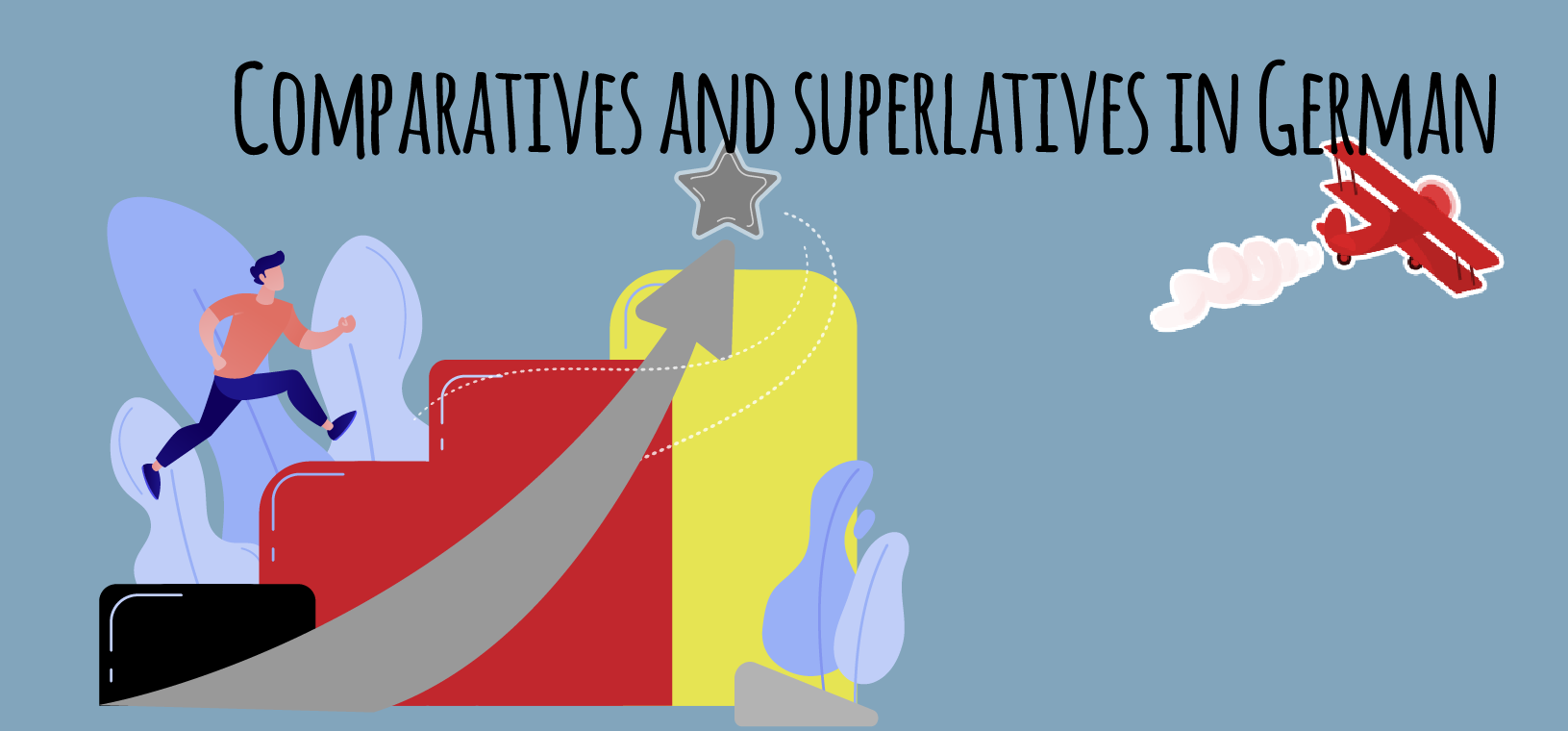Comparatives and superlatives in German

Comparatives and superlatives in German
ÍNDICE DE CONTENIDOS
In the German language adjectives can be compared. This comparison is required to compare things or to express different degrees of qualities. It distinguishes between three different forms. In the German language , the adjective has three degrees: positive, comparative, and superlative.
The comparative and superlative degrees of the adjective will allow you to establish relations of equality or superiority between them based on their characteristics. When they precede a noun (attributive function) these adjectives must also be declined according to the presence and type of the determinant that precedes them.
Positive, comparative and superlative
- Positive degree : it is the adjective as you know it, without changes. Ex: Das Haus is alt . (The house is old)
- Comparative degree : there are two types of comparative, that of equality and that of superiority. Keep in mind that in this case there is no comparative of inferiority.
- Superlative degree : it is the highest degree that the adjective reaches. An example in English would be, “My mom cooks the richest food.” It is constructed from the adjective form + est (n) preceded by am.
Example : Der Orangensaft ist am billigsten. (Orange juice is the cheapest). or, Das ist der billigste Saft. (This is the cheapest juice).
The comparative and the superlative according to the adjective
The comparative and the superlative in German will depend on whether the adjective is behind the noun (predicative function), if it is in front (attributive function) or if it works as an adverb (adverbial function).
Predicative function(adjective behind noun | Attributive function(adjective before noun) | Adverbial function |
| Positive: Olivia ist jung
(Olivia is young) | Positive: Olivia ist eine gute Shülerin
(Olivia is a good student ) | Positive: Olivia rennt schnell.
(Olivia runs fast) |
| Comparative: Olivia ist Jünger als Pepa
(Olivia is younger than Pepa) | Comparative: Olivia ist eine bessere Shülerin als Pepa
(Olivia is a better student than Pepa) | Comparative: Olivia rennt schneller als Pepa
(Olivia runs faster than Pepa) |
| Superlative: Olivia ist am jüngsten
(Olivia is the youngest)
| Superlative: Olivia ist die veste shülerin.
(Olivia is the best student) | Superltive: Olivia rennt am Shnelisten.
(Olivia runs the fastest) |
Predicative function
Comparative of equality:
So + adjektiv + wie
(As)
- Das auto A ist so schnell wie das auto B
(Car A is as fast as Car B
Comparison of non-equality
Adjektiv-er + als
(more than)
- Das auto A ist kleiner als das auto B
Car A is smaller than Car B
Superlative:
Am + Adjektiv-sten
(the most)
- Two cars A ist am kleisten.
(Car A is the smallest)
When the adjective functions as an adverb, the comparative and the superlative are formed the same.
Attributive function
(Adjective before the noun)
Comparative:
Adjektiv-er-Adjektivdeklination
(one more)
- Ich wil ein billigeres Auto
(I want a cheaper car)
Superlative :
Bestimmte artikel + Adjektiv-st-Adjektivdeklination
(the most)
- Ich will das billigste Auto.
(I want the cheapest car)
Special adjectives
There are irregular adjectives that must be studied, their comparative and their superlative:
| Komparativ | Superlativ | |
| gern | lieber | Am liebsten |
| gut | besser | Am besten |
| viel | mehr | Am meisten |
| dunkel | dunkler | Am dunkelsten |
| edel | edler | Am edelsten |
| teuer | teurer | Am teuersten |
| nah | näher | Am nächsten |
| hoch | höher | Am höchsten |
There are some adjectives, especially monosyllables, that carry “Umlaut” (in the vowels a, o, u) in the comparative and superlative:
komparativ | Superlativ | |
| alt | älter | am ältesten |
| arm | ärmer | am ärmsten |
| GroB | gröBer | am gröBten |
| jung | jünger | am jüngsten |
| kalt | kälter | am kältesten |
| klug | klüger | am klügsten |
| kurz | kurzer | am kürzesten |
| lang | länger | am längsten |
| warm | wärmer | am wärmsten |
- Attention: “gern” is always an adverb.
- Attention : the comparatives “mehr” and “weniger” are not inflected.
Example:
| Adjektiv hinter dem noun |
komparativ | superlativ |
| Adjektiv-er + als | Am + adkjetiv-sten |
- Das Auto C ist langsmer als das auto B
Car C is slower than Car B
- Das Auto B ist langsmer als das auto A
Coehe B is slower than car A
- Das Auto A ist am schnellsten.
Car A is the fastest



